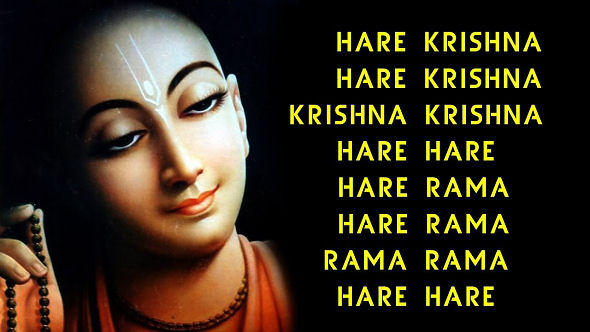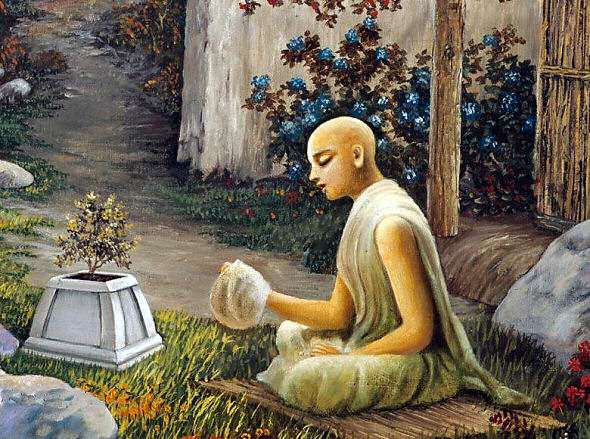
हरे कृष्ण हरे कृष्ण कृष्ण कृष्ण हरे हरे | हरे राम हरे राम राम राम हरे हरे ||
The Mahā-Mantra says:
“My Dear Lord Kṛṣṇa, My Dear Lord Rāma, Oh Energie Of The Lord Hari, Please Kindly Engage Me In Your Transcendental Service.”
“The most important is the Bṛhan-nāradīya Purāṇa verse Hare Kṛṣṇa, Hare Kṛṣṇa, Kṛṣṇa Kṛṣṇa, Hare Hare/ Hare Rāma, Hare Rāma, Rāma Rāma, Hare Hare.” (S.B.3.13.25)
Devahūti prays:
Oh, how glorious are they whose tongues are chanting Your holy name! Even if born in the families of dog-eaters, such persons are worshipable. Persons who chant the holy name of Your Lordship must have executed all kinds of austerities and fire sacrifices and achieved all the good manners of the Āryans. To be chanting the holy name of Your Lordship, they must have bathed at holy places of pilgrimage, studied the Vedas and fulfilled everything required.
As it is stated in the previous verse, a person who has once offenselessly chanted the holy name of God becomes immediately eligible to perform Vedic sacrifices. One should not be astonished by this statement of Śrīmad-Bhāgavatam. One should not disbelieve or think, “How by chanting the holy name of the Lord can one become a holy man to be compared to the most elevated brāhmaṇa?” To eradicate such doubts in the minds of unbelievers, this verse affirms that the stage of chanting of the holy name of the Lord is not sudden, but that the chanters have already performed all kinds of Vedic rituals and sacrifices. It is not very astounding, for no one in this life can chant the holy name of the Lord unless he has passed all lower stages, such as performing the Vedic ritualistic sacrifices, studying the Vedas and practicing good behavior like that of the Āryans. All this must first have been done. Just as a student in a law class is to be understood to have already graduated from general education, anyone who is engaged in the chanting of the holy name of the Lord—Hare Kṛṣṇa, Hare Kṛṣṇa, Kṛṣṇa Kṛṣṇa, Hare Hare/ Hare Rāma, Hare Rāma, Rāma Rāma, Hare Hare—must have already passed all lower stages. It is said that those who simply chant the holy name with the tip of the tongue are glorious. One does not even have to chant the holy name and understand the whole procedure, namely the offensive stage, offenseless stage and pure stage; if the holy name is sounded on the tip of the tongue, that is also sufficient. It is said herein that nāma, a singular number, one name, Kṛṣṇa or Rāma, is sufficient. It is not that one has to chant all the holy names of the Lord. The holy names of the Lord are innumerable, and one does not have to chant all the names to prove that he has already undergone all the processes of Vedic ritualistic ceremonies. If one chants once only, it is to be understood that he has already passed all the examinations, not to speak of those who are chanting always, twenty-four hours a day. It is specifically said here, tubhyam: “unto You only.” One must chant God’s name, not, as the Māyāvādī philosophers say, any name, such as a demigod’s name or the names of God’s energies. Only the holy name of the Supreme Lord will be effective. Anyone who compares the holy name of the Supreme Lord to the names of the demigods is called pāṣaṇḍī, or an offender.

Haridas Thakur – Nama Acharya
The holy name has to be chanted to please the Supreme Lord, and not for any sense gratification or professional purpose. If this pure mentality is there, then even though a person is born of a low family, such as a dog-eater’s, he is so glorious that not only has he purified himself, but he is quite competent to deliver others. He is competent to speak on the importance of the transcendental name, just as Ṭhākura Haridāsa did. He was apparently born in a family of Muhammadans, but because he was chanting the holy name of the Supreme Lord offenselessly, Lord Caitanya empowered him to become the authority, or ācārya, of spreading the name. It did not matter that he was born in a family which was not following the Vedic rules and regulations. Caitanya Mahāprabhu and Advaita Prabhu accepted him as an authority because he was offenselessly chanting the name of the Lord.
Sri Advaita Acarya
Authorities like Advaita Prabhu and Lord Caitanya immediately accepted that he had already performed all kinds of austerities, studied the Vedas and performed all sacrifices. That is automatically understood. There is a hereditary class of brāhmaṇas called the smārta-brāhmaṇas, however, who are of the opinion that even if such persons who are chanting the holy name of the Lord are accepted as purified, they still have to perform the Vedic rites or await their next birth in a family of brāhmaṇas so that they can perform the Vedic rituals. But actually that is not the case. Such a man does not need to wait for the next birth to become purified. He is at once purified. It is understood that he has already performed all sorts of rites. It is the so-called brāhmaṇas who actually have to undergo different kinds of austerities before reaching that point of purification. There are many other Vedic performances which are not described here. All such Vedic rituals have been already performed by the chanters of the holy name.
The word juhuvuḥ means that the chanters of the holy name have already performed all kinds of sacrifices. Sasnuḥ means that they have already traveled to all the holy places of pilgrimage and taken part in purificatory activities at those places. They are called āryāḥ because they have already finished all these requirements, and therefore they must be among the Āryans or those who have qualified themselves to become Āryans. “Āryan” refers to those who are civilized, whose manners are regulated according to the Vedic rituals. Any devotee who is chanting the holy name of the Lord is the best kind of Āryan. Unless one studies the Vedas, one cannot become an Āryan, but it is automatically understood that the chanters have already studied all the Vedic literature. The specific word used here is anūcuḥ,which means that because they have already completed all those recommended acts, they have become qualified to be spiritual masters.
The very word gṛṇanti, which is used in this verse, means to be already established in the perfectional stage of ritualistic performances. If one is seated on the bench of a high court and is giving judgment on cases, it means that he has already passed all legal exams and is better than those who are engaged in the study of law or those expecting to study law in the future. In a similar way, persons who are chanting the holy name are transcendental to those who are factually performing the Vedic rituals and those who expect to be qualified (or, in other words, those who are born in families of brāhmaṇas but have not yet undergone the reformatory processes and who therefore expect to study the Vedic rituals and perform the sacrifices in the future).
There are many Vedic statements in different places saying that anyone who chants the holy name of the Lord becomes immediately freed from conditional life and that anyone who hears the holy name of the Lord, even though born of a family of dog-eaters, also becomes liberated from the clutches of material entanglement. (S.B.3.33.7)
Chanting in the age of Kali-Yuga, as the only means
In this age of logic, argument and disagreement, the chanting of Hare Krishna is the only means for self-realization. Because this transcendental vibration alone can deliver the conditioned soul, it is considered to be the essence of the Vedanta-sutra, as it is stated by Lord Brahma in the Kalisantarana Upanisad that the essence of all Vedic literature is the chanting of these holy names of Krishna:
hare krishna hare krishna / krishna krishna hare hare
hare rama hare rama / rama rama hare hare
iti sodasakam namnam / kali-kalmasa-nasanam
natah parataropayah / sarva-vedesu drsyate
“These sixteen words of the Hare Krishna mantra are especially meant for counteracting the sins of the age of Kali. To save oneself from the contamination of this age there is no alternative but to chant this maha-mantra. After searching through all the Vedic literatures one cannot find a method of religion for this age so sublime as the chanting of Hare Krishna.”
According to the material conception, there is duality between the name, form, quality, emotions and activities of a person and the person himself, but as far as the transcendental vibration is concerned, there is no such limitation, for it descends from the spiritual world. In the spiritual world there is no difference between the name of the person and the quality of the person. Of course in the material world there is a difference. Because the Mayavadi philosophers cannot understand this, they cannot utter the transcendental vibration.







Pamho agtacbsp, THIS IS THE MANTRA THAT CHANGED OUR LIVES BECAUSE OF SRI CAITANYA MAHAPRABHU MERCY. To chant one round of MMHK without space out by hearing with attention properly takes ten minutes then to chant sixteen rounds like that give us the vision of eternity to get rid of the consequences of the karma by seeing what is behind and beyond that then a devotee keep always far from the source of suffering because he realised that got a beginning therefore a end as well.this maha mantra hare krsna keeps changing lives until the end of this small golden age within this terrible and rotten kali yuga.our SANATANA DHARMA keep us busy therefore we never say we got nothing to do because we found our eternal occupation by the mercy of SSGG AGTACBSP ys haribol